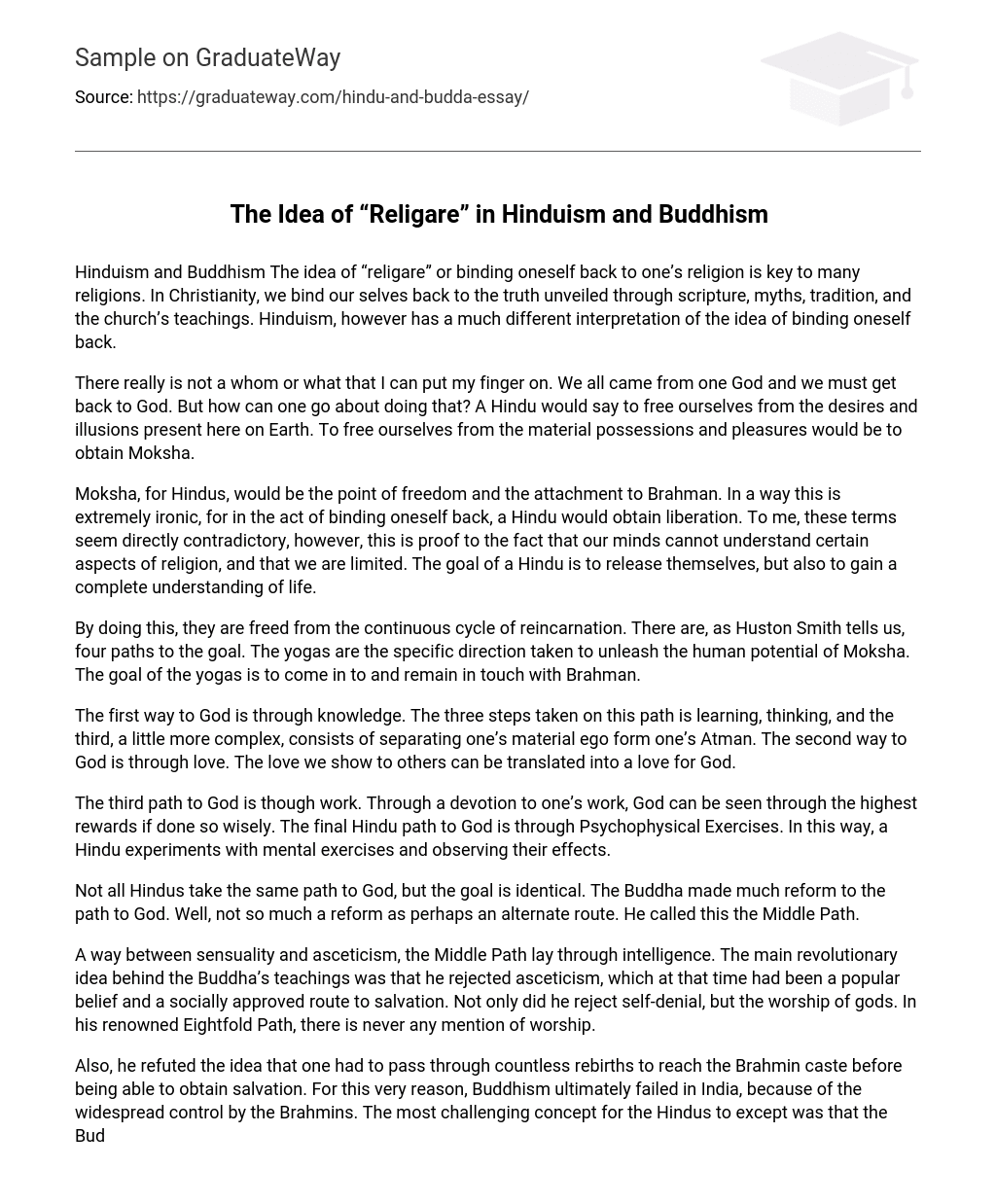The concept of “religare” is important in various religions as a means of reconnecting with one’s faith. Christianity uses scripture, myths, tradition, and church teachings to establish this reconnection with revealed truth. In contrast, Hinduism provides a distinct interpretation of religare.
There is no specific entity to identify or pinpoint. We all originated from one deity and must return to that deity. However, the question remains: how can this be achieved? In Hinduism, the path to liberation involves freeing oneself from earthly desires and illusions. Achieving Moksha would entail relinquishing material possessions and pleasures.
Moksha, believed by Hindus, represents the state of liberation and connection with Brahman. Ironically, this pursuit involves binding oneself back to attain freedom. Though these terms appear contradictory, they serve as proof that humans have limited understanding regarding certain aspects of religion. A Hindu’s objective is to both free themselves and achieve a comprehensive comprehension of life.
According to Huston Smith, there are four paths to achieving the goal of Moksha, where individuals can break free from the continuous cycle of reincarnation. These paths, known as yogas, provide specific directions for unleashing the human potential. The ultimate aim of the yogas is to establish and maintain a connection with Brahman.
The path to God can be achieved through two ways: knowledge and love. The first way involves three steps – learning, thinking, and separating one’s material ego from one’s Atman. On the other hand, the second way is achieved by expressing love towards others, which can also be translated into a love for God.
The third way to connect with God is through work. By dedicating oneself to their work, one can witness God’s presence and the great rewards that come from it. Another Hindu approach to reaching God is through Psychophysical Exercises, where individuals engage in mental exercises and carefully observe their effects.
While not all Hindus follow the same approach to reach God, their ultimate objective remains the same. The Buddha introduced significant changes to the path leading to God, which can be considered as an alternative route rather than a complete reform. He referred to this alternative route as the Middle Path.
The Middle Path, situated between sensuality and asceticism, advocated the use of intelligence. The Buddha’s teachings introduced a revolutionary concept by rejecting asceticism, which was widely accepted and socially endorsed as a way to achieve salvation. In addition to denying self-denial, the Buddha also dismissed the worship of gods. The renowned Eightfold Path, outlined by him, completely excludes any mention of worship.
The notion of having to undergo numerous rebirths in order to achieve the Brahmin caste before attaining salvation was also discredited by him. Consequently, Buddhism faced ultimate failure in India due to the dominant influence of the Brahmins. The concept that proved most difficult for Hindus to embrace was the Buddha’s teaching that the soul was non-existent. Hindus believed that the Atman, or soul, was in fact God.
According to the Buddha, if the soul is solely God, it is not individual and is considered an An-Atman or no soul. Buddhist attainment of liberation manifests as Nirvana. In Nirvana, individuals let go of their longing for a false identity, similar to Hinduism. Interestingly, extinguishing this longing happens simultaneously with enlightenment, as in Hinduism.
By studying Hinduism and Buddhism, I have gained enlightenment as it has answered my questions about the interconnectedness of life and the continuous cycle of birth and death. The concept in Hinduism that everything is intricately connected because of Brahman has always fascinated me.
The concept that material wealth carries no significance is a thought that I find unsettling, as I am undeniably influenced by the current societal emphasis on riches and influence. It angers me to consider that my belongings hold no value, yet inexplicably I am intrigued by the principles of Hinduism. Among the various religious teachings explored thus far, this particular realization is perplexing to me. What implications does it carry? I have stumbled upon something here that has left me utterly bewildered.
How can I possibly find meaning in multiple religions? It’s as if I could cherry-pick elements from various faiths and create a new, comprehensive belief system. However, this notion is impractical due to the deep-rooted traditions spanning countless centuries. I yearn for a fresh start, where the concept of God is universally understood and unencumbered by ancestral customs. At times, I feel that our ancestors and their traditions hinder our pursuit of an elusive enlightenment that even great spiritual leaders like Buddha or Brahmin have yet to attain.
In summary, I hope to pursue the study of religions beyond high school, as it may potentially unveil some fascinating findings for me.





